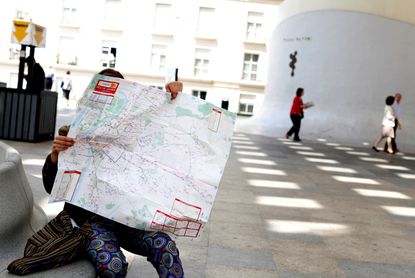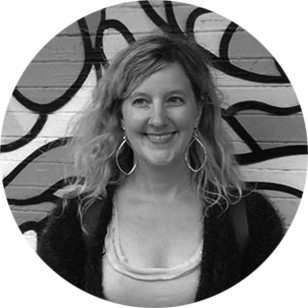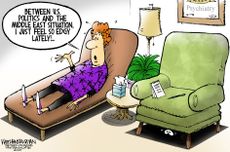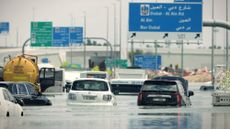How travel treats my anxiety better than antidepressants
Something about being in a new place changes my brain in a way drugs and therapy never could


The taxi hurtled through downtown Naples, weaving through traffic, with me hanging on in the backseat. We were headed to the police station. Here, in one of Europe's crime capitals, where signposts warn travelers about incessant pickpocketing, my passport had gone missing. I was sure it had been stolen.
Next to me on the seat, tucked away in my backpack, was a bottle of Ativan, the sedative I always carry with me to calm my nerves and tell my brain and body that everything is going to be okay. But I didn't reach for it. Of course, I was upset. I didn't speak Italian, and I knew no hotel in Italy would take me in without my passport, so I was preparing for a long night spent sleeping on uncomfortable chairs in a police station. But there was no panic. No familiar creeping sense of my body going into flight or fight mode. I didn't feel a knot in my throat, or my heart trying to break through my rib cage, as I sometimes do when I am home just going about my day. The Ativan stayed in my backpack.
My taxi driver received a call; a hotel worker standing in front of the lobby had found my passport on the ground. It had fallen out of my backpack. When I walked into the hotel lobby, the worker looked at the passport photo, then at me, and handed it to over, like a freshly picked spring blossom. I hugged him and then I went about my business, relieved but surprisingly unshaken. In fact, I felt focused, relaxed.
Subscribe to The Week
Escape your echo chamber. Get the facts behind the news, plus analysis from multiple perspectives.

Sign up for The Week's Free Newsletters
From our morning news briefing to a weekly Good News Newsletter, get the best of The Week delivered directly to your inbox.
From our morning news briefing to a weekly Good News Newsletter, get the best of The Week delivered directly to your inbox.
If this had happened to me while I was at home, I would have been an absolute wreck. But it was as if being in a foreign place — even without proper documentation — was therapy enough. That's because travel quells my anxiety. As long as I'm traveling, my brain and body are relaxed. Travel works better than antidepressants ever have.
Looking at me, you probably wouldn't know I'm among the 3 percent of the U.S. population living with generalized anxiety disorder. I'm innately cheerful, even off antidepressants. I don't avoid places, people, or activities. I don't hide in my house. I don't bite my nails. I don't fidget. I don't laugh nervously. I don't twirl my hair or jiggle my legs. I can easily sit still for long stretches of time. I rarely drink, I don't smoke. After nearly 20 years together, my husband still can't tell if or when I feel anxious about something. My mental jumping jacks are visible to no one. But mental illness has insidiously rooted itself into my immediate family tree. It lingers, passing from generation to generation, like some ugly heirloom we can't get rid of.
My first panic attack, at age 38, sent me to the emergency room. I would have two more "big ones" before learning how to breathe my way through them. Throw some hypochondria and seasonal affective disorder in there, and you have a complete picture of my brain chemistry. For three and a half years, Lexapro, a common selective-serotonin reuptake inhibitor (SSRI), muted this hypersensitivity, taking the sting out of my intrusive thoughts, quietly locking the scary ones away in a cupboard. SSRIs are in millions of medicine cabinets, and for a while, they were in mine.
But on May 15, 2015, I took my last pill, and decided I would push through whatever withdrawal symptoms I experienced. A year later, I marked my first anniversary of being off antidepressants while on a bus ride through Cuba's countryside, going from Havana to Cienfuegos.
Sign up for Today's Best Articles in your inbox
A free daily email with the biggest news stories of the day – and the best features from TheWeek.com
Cuba was an ideal place to tell my anxiety to go to hell. There was plenty going on to redirect my overactive mind: palm trees, abundant sunshine, colonial architecture, street corner jam sessions, maracas, and drums. There was the low grunt of vintage cars, the occasional crash of the Atlantic Ocean against the Melacon, Havana's sea wall. Salsa music came from someone's open window. As I walked the cobblestone streets on my own, men said hello, asking me if I wanted a Cuban boyfriend. None of this overwhelmed me. I felt safe there, just as I had on the streets of Naples.
I truly began to take note of this strange sense of calm during a trip to Playa del Carmen, Mexico, last October. I was traveling alone. I ended up at a crappy resort. My room wasn't ready when I arrived, the resort was loud, with music blaring until 11 p.m. and donkeys braying at 4 a.m. I overheard people spitting into the pool. There were cockroaches in my room. It was enough to fray any tired traveler's nerves, yet surprisingly, I didn't feel at all edgy. I stood on the beach listening to the waves, watching cruise ships inch their way towards Cozumel, drinking up the sunshine, Mexico's heat massaging the tightness from my neck and shoulders, the nervousness from the flight finally abating. I could feel my body soften.
Travel is fraught with inconvenience and uncertainty: late or canceled flights, bad weather, lost luggage, rude passengers, eating something you shouldn't have, catching something you don't want. I've experienced all of that, and still I keep booking trips. The beauty of a thousand-year-old temple in Kyoto, Japan, can pull me out of my head and off that well-trodden path of rumination and worry. I take my fears to the skies, to the beach, to the mountains, to places where I don't know the language. Travel changes the channel, giving my brain something else to focus on while engaging all five senses, sometimes simultaneously.
Anxiety is about control; travel is about forgoing control. I constantly swing between the two. Most people I know with chronic anxiety disorders aren't avid travelers; home is where they feel the safest. Most jet-setters aren't folks who meet the DSM-V criteria for clinical anxiety or depression; they love getting on airplanes and embrace uncertainty with ease. How I landed in this dichotomy is beyond me. But I can tell you this: Calm follows me when I'm on the road. Don't get me wrong, so does my anxiety. It follows me through TSA security checks and peaks on airplanes. But it wanes during customs lines or the taxi ride to a hotel, and eventually lags behind me like some forgotten stray dog as I peruse cafes and museums.
There are no studies showing any direct correlations between travel and managing anxiety, depression, or any other mental health condition. However, there is some research demonstrating a correlation between travel and overall happiness. An often-cited 2010 study published in Applied Research in Quality of Life reported that the very act of planning a vacation boosted well-being.
"Short-term benefits include stress reduction, a sense of excitement, and a boost in happiness," says Jaime Kurtz, an associate professor of psychology at James Madison University in Harrisonburg, Virginia, who studies strategies for personal happiness. "Some studies found that longer-term travel (months or years) fosters desirable changes in personality, like increased openness to new experiences and creativity. Over the long-term, a life full of travel contributes to a wealth of positive memories and is inversely related to late-life regret."
Growing evidence supports the notion that spending money on experiences — not material goods — increases happiness and improves mindfulness. Some even assert that travel itself fulfills what psychologist Abraham Maslow termed as the human "hierarchy of needs" for safety, esteem, love, belonging, and self-actualization, or what Carl Jung referred to as our individuation. Even Elizabeth Gilbert's blockbuster book Eat, Pray, Love, now celebrating its 10th anniversary this year, touches on the meaning of the quest: When we travel, when we are away from the familiar, perhaps surrounded by a language and customs filled with nuances that would take us years to understand, we begin to discover ourselves.
Given that I've been to 15 countries so far, I have no doubt that I've spent far more money on bopping around the globe than on drugs and shrinks. Conversations with Ivy-educated psychiatrists were unsuccessful in reframing my thoughts in a way that travel could. No one ever prescribed me a trip. That's not the American way. Antidepressant use in the United States has increased by 400 percent since the late 1980s. Meanwhile, an estimated 40 percent of Americans haven't used their paid vacation time. We pop pills, but won't take time off for a road trip.
Count me out of both groups. Instead, you'll find me researching vacations, not because I need to vacate anything, but because I simply want to go. As I keep telling my 12-year-old daughter, "the world should be experienced."
None of my trips will ever end my anxiety entirely. I know that. Travel only changes my relationship to my anxiety. I will never be out of the woods. There will only be more woods. But that's okay. I like a long journey.
Create an account with the same email registered to your subscription to unlock access.
Katrina Woznicki is a freelance writer and journalist with 20 years of experience. Her work has appeared in the Los Angeles Times, Lonely Planet, National Geographic Traveler, Guernica, Catapult, The Boston Globe, Newsweek and Elle, among others. She is working on her first novel. Visit her website or follow her travels on Twitter or Instagram.
-
 'A direct, protracted war with Israel is not something Iran is equipped to fight'
'A direct, protracted war with Israel is not something Iran is equipped to fight'Instant Opinion Opinion, comment and editorials of the day
By Harold Maass, The Week US Published
-
 Today's political cartoons - April 17, 2024
Today's political cartoons - April 17, 2024Cartoons Wednesday's cartoons - political anxiety, jury sorting hat, and more
By The Week US Published
-
 Arid Gulf states hit with year's worth of rain
Arid Gulf states hit with year's worth of rainSpeed Read The historic flooding in Dubai is tied to climate change
By Peter Weber, The Week US Published